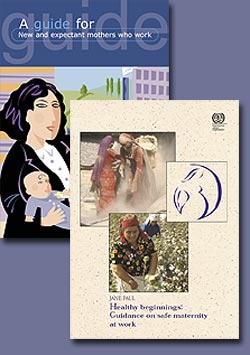Pregnant Workers Are Not Automatically Entitled To A Workplace Assessment
The assumption that all pregnant employees require a risk assessment to be carried out by their employer has been found to be incorrect in a recent industrial tribunal decision O’Neill v Buckinghamshire County Council [2010] UKEAT/0020/09
 This tribunal decision has set the precedent that without evidence that their work involves a risk to their health and safety, pregnant workers are not automatically entitled to a work assessment.
This tribunal decision has set the precedent that without evidence that their work involves a risk to their health and safety, pregnant workers are not automatically entitled to a work assessment.
The details below are those reported by Croner's website dealing with Case Law (16th Feb 2010):
The Facts
On 13 June 2006 the claimant, a primary school teacher who was in the middle of a disciplinary investigation, informed her head teacher that she was pregnant. Shortly afterwards the head teacher prepared a standard form risk assessment form for her, but had not got around to discussing it with her when, on 19 September 2006, the claimant went on sick leave.
The claimant gave notice on 22 June 2007 of her intention to return to work at the end of her maternity leave. Instead, on 30 August 2007, she resigned, claiming constructive dismissal and pregnancy-related discrimination (citing an alleged failure to carry out a risk assessment).
The Decision: The employment tribunal
As the claimant had given notice of her intention to return to work on 22 June 2007, nothing before then can have destroyed her trust and confidence in her employer. Her decision to resign was made over the summer, having exercised her right to gain maximum financial benefit during her maternity leave, so as to avoid everything that would follow from her return to work, including the disciplinary hearing.
The school had not failed to carry out a risk assessment, and had in any event been under no duty to do so.
The claim was dismissed.
The Decision: The EAT
The claimant’s appeal was dismissed.
The notice of intention to return to work given by the claimant on 22 June indicated that she was not saying that trust and confidence had broken down as at that date. However, this would not have prevented her from relying on some earlier event together with whatever later event amounted to the final straw.
Under regulation 16 of the Management of Health and Safety at Work Regulations 1999, the employer was under a duty to conduct a risk assessment for a pregnant employee (who had given notice that she was pregnant) where the work is of a kind which could involve a risk of harm or danger to the health and safety of the expectant mother or her baby, and the risk arises from either processes, working conditions or physical, chemical or biological agents in the workplace.
This meant that there was no general obligation to carry out a risk assessment on pregnant employees.
In this case there was no reason to conclude that the kind of work carried out by the claimant involved a risk of harm or danger to her as a pregnant worker. (Also, contrary to what the claimant had sought to argue, facing disciplinary proceedings did not amount to a working condition or process of the type envisaged by the law.)
Further, a risk assessment had in fact been carried out by the head teacher, notwithstanding that a meeting had not taken place. There was nothing in the regulations to indicate that a meeting with the employee concerned was required before the obligation to carry out a risk assessment was satisfied.
For a failure to carry out a risk assessment to amount to pregnancy-related discrimination, it would have had to have been shown that the employer was under a duty to carry out a risk assessment, and that there had been a breach of that duty.
Had this been established, it would not have been necessary for the claimant to go on to show that there was resulting detriment from that failure. If obligation and failure are established, discrimination results.
The conclusion drawn by the decision of the EAT is that:
Even though any assessment required by the Management of Health and Safety at Work Regulations 1999 should also include an assessment of risk, there has to be some evidence of risk, in the first place, that the work is of a kind which could involve risk to the health or safety of a new or expectant mother or her baby. Without this, the obligation to carry out a risk assessment in respect of new or expectant mothers does not arise.
Source: Croner's